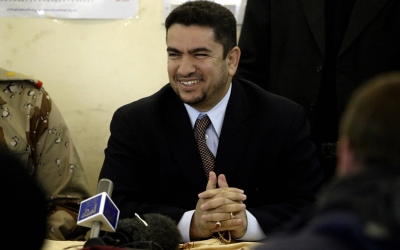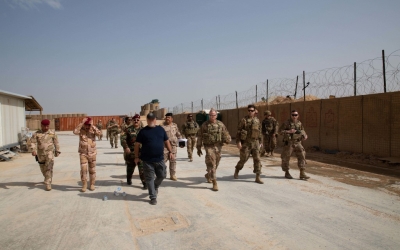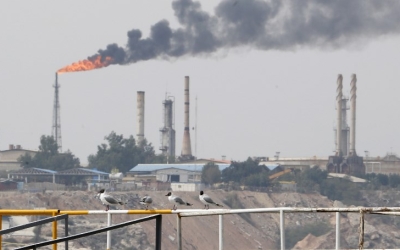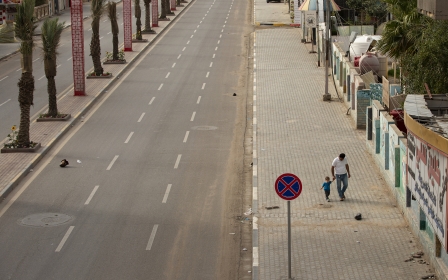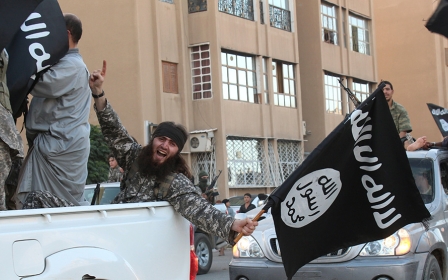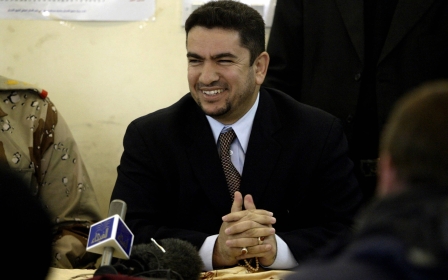Rockets hit Baghdad's Green Zone as US-led coalition leaves Iraqi base
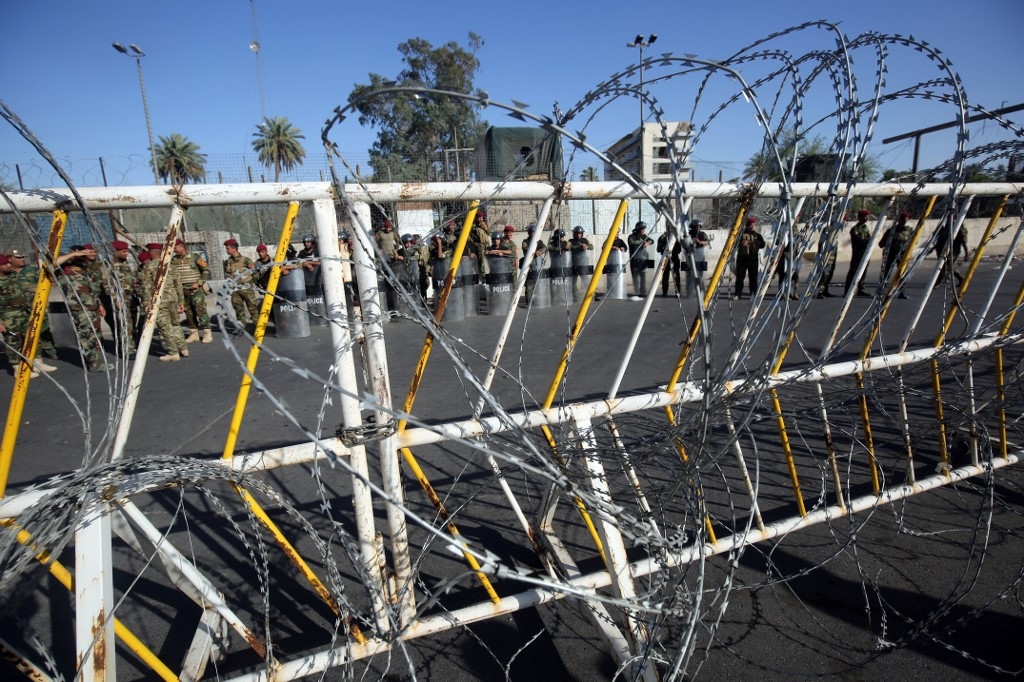
Two rockets slammed into Baghdad's high-security Green Zone on Thursday, hours before US-led forces pulled out of a second military base in Iraq.
Before dawn, the rockets punched into an empty square near an Iraqi security HQ in the secure zone, where government buildings and foreign embassies are based, Iraqi security forces said in a statement.
New MEE newsletter: Jerusalem Dispatch
Sign up to get the latest insights and analysis on Israel-Palestine, alongside Turkey Unpacked and other MEE newsletters
An Iraqi security source told AFP that the intended target appeared to be the US embassy, a sprawling compound a few hundred metres further south on the banks of the Tigris. There were no reports of casualties, although previous attacks have resulted in fatalities.
An estimated 7,500 foreign troops are in Iraq as part of the US-led coalition supporting local troops - but those numbers are being significantly reduced this month.
The alliance is temporarily bringing some trainers home as a precautionary measure amid the coronavirus pandemic, as well as leaving some Iraqi bases altogether.
Those bases and foreign embassies, particularly the American mission in the Iraqi capital, have been targeted by more than two dozen rocket strikes since late October. The attacks, which the US has blamed on Iranian-backed armed groups, have prompted fears of a proxy war on Iraqi soil.
Coalition forces leave base
The 5,200 US troops stationed in Iraqi bases make up the bulk of the coalition force helping hunt Islamic State (IS) sleeper cells across the country.
Earlier this month, two US military personnel and a British soldier were killed in a rocket attack on Taji airbase north of Baghdad, which was hit again two days later.
Iraq declared IS defeated in late 2017: the coalition is now implementing plans to consolidate its troop presence across the country.
On Thursday, around 800 troops began leaving the northern Qayyarah air base, used in 2016 and 2017 to help plan the fight against IS in nearby Mosul.
"Today the coalition transferred Qayyarah airbase to the full control of the Iraqi security forces," Myles Caggins, a coalition spokesman, told AFP. "The coalition had a small area inside the base and we will have several hundred troops departing this base and eventually leaving Iraq."
The departing forces include US and French troops as well as civilian contractors, according to a coalition statement. In coming weeks, they will also leave a large base in Kirkuk.
Rockets have rained down on both Qayyarah and Kirkuk in recent months, with one late-December attack killing a US contractor stationed in Kirkuk.
The US has blamed those attacks on Kataeb Hezbollah, an Iran-backed group within the Iraqi Hashd al-Shaabi paramilitary network. Hashd al-Shaabi has now been formally integrated into the Iraqi state's security forces but more hardline groups continue to operate independently.
Iran alleges more US troops
Around 300 coalition troops were reported to have left the western al-Qaim base in mid-March, handing it over in full to Iraqi troops.
However, Iran’s official news agency IRNA, quoting Iraqi sources, reported on Thursday that the US had moved the al-Qaim forces to the Ain al-Asad air base in Iraq, which was targeted by an Islamic Revolutionary Guard Corps missile attack in early January.
IRNA quoted Qusay al-Anbari, a high-ranking member of the Iraqi Hashd al-Shaabi paramilitary group, as saying that the US withdrawal from al-Qaim was a tactical move to increase the number of US forces at Ain al-Asad.
In another report, IRNA said that US forces were secretly preparing to build a new base in the Umm Samij area in Iraq’s al-Anbar province. It quoted Karim Alawi, a member of the Iraqi parliament’s security and defence committee, as saying that the US military had already started to deploy its Patriot missile defence system in Iraq.
On Wednesday, IRNA’s Baghdad bureau reported that officially released numbers, indicating that between 5,000 and 6,000 US troops are in Iraq, were incorrect. It said that there were about 20,000 US forces and military contractors in the country, and that these were a possible threat to spreading the coronavirus among Iraqis.
'American Satan'
This month's attacks in Iraq have been claimed by a previously unknown group identifying itself as Usbat al-Thaereen (League of the Revolutionaries).
In online videos set to music, armed masked men rail against the "American Satan" and pledge to avenge "victims" of US air strikes on Iraqi forces.
The coalition, however, believes the group is an amalgamation of better-known anti-US groups. "It's the same old actors, and they're organising themselves slightly differently," a senior coalition official told reporters.
The coalition has simultaneously been redeploying training forces who had been coaching Iraqi troops.
Trainers amount to a third of the total coalition force. British, French, Australian and Czech troops coaching Iraqi counterparts were being temporarily sent home as Baghdad put a hold on training operations to prevent the spread of Covid-19.
The US embassy on Thursday also said it was drawing down staff "due to a combination of security conditions and restricted travel options as a result of the global Covid-19 pandemic".
On Thursday, Iraq extended a travel ban within the country and to and from its airports until 11 April, as part of strict steps to curb the outbreak of the coronavirus, the government said in a statement. Iraq's authorities began the restrictions on 17 March, banning travel and all inbound and outbound flights from the country's airports.
At least 346 cases of Covid-19 have been confirmed so far in Iraq, according to the health ministry, and 29 people have died.
US grants Iraq shortest sanctions waiver yet
Meanwhile, the US on Thursday granted Iraq a 30-day waiver to keep importing Iranian gas despite US sanctions, two Iraqi officials told AFP, the shortest extension yet.
The US slapped tough sanctions on the Iranian energy sector in late 2018 and has granted Iraq a series of waivers, usually for 45, 90 or 120 days.
Baghdad relies on gas and electricity imports from its neighbour Tehran to supply about a third of its power grid, crippled by years of conflict and poor maintenance. "This is the final extension," one source at the Iraqi president's office told AFP.
The source said Washington had been frustrated that Iran was meddling in the government formation process in Iraq.
Adnan Zurfi, who has had close ties with US officials since the American-led invasion of Iraq in 2003, was nominated for Iraq's premiership on 17 March and has a month to pull together his cabinet.
"The US did not want to put Zurfi in a difficult position by not renewing the waiver," a second senior Iraqi official told AFP, confirming the 30-day extension.
Middle East Eye delivers independent and unrivalled coverage and analysis of the Middle East, North Africa and beyond. To learn more about republishing this content and the associated fees, please fill out this form. More about MEE can be found here.


